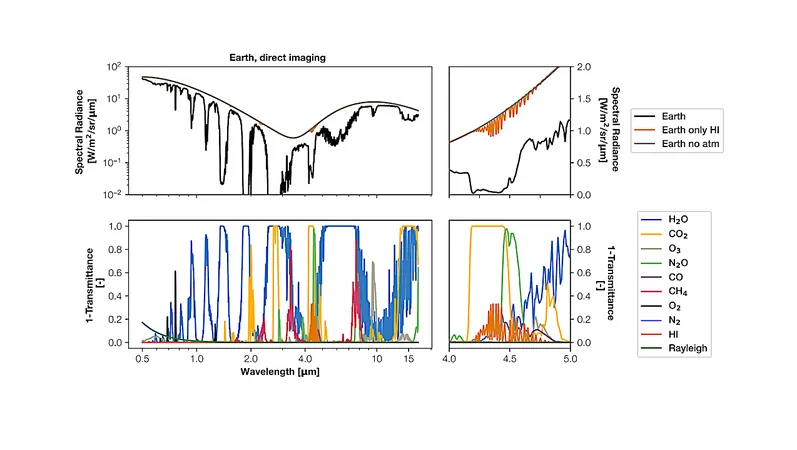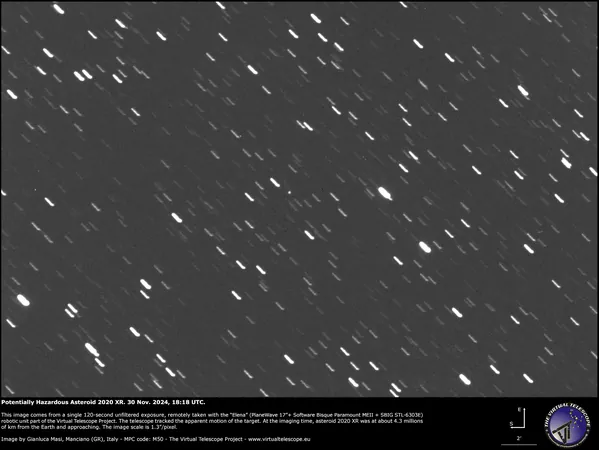
Unveiling the Cosmic Secrets: Can We Detect Radioactive Elements in Exoplanet Atmospheres?
2024-12-01
Author: Michael
As we push the boundaries of astronomical technology, the dream of characterizing the atmospheres of distant exoplanets is inching closer to reality. Particularly intriguing is the potential to uncover spectroscopic signatures of radionuclides—elements that could provide unprecedented insight into these alien worlds.
The detection of spectral features in exoplanetary atmospheres is not merely an academic exercise; it could reveal critical information regarding the atmospheric composition, and intriguingly, it may even point to potential biosignatures indicating life beyond Earth. However, achieving this level of detection hinges on the sensitivity of our instruments and the duration of our observations. A key question lies in whether we can pick up the faint signals from these elusive radioactive elements.
Future missions aimed at remote observations could drastically change our understanding of exoplanetary geology and atmospheres. Radionuclides might originate from a variety of sources, including cosmic phenomena, geological processes, or human industrial activity, much like those we observe on our own planet. The implications of detecting such elements could offer vital clues about a planet's past and its environmental conditions—information critical for evaluating its habitability.
Yet the challenge is daunting. Many radionuclides bind to aerosols or other particulate matter, complicating remote detection efforts. Existing spectral data for long-lived radionuclides is limited, and the sensitivity needed to identify their spectral characteristics exceeds the capability required to detect molecular oxygen by several orders of magnitude. In simpler terms, finding these radioactive signatures will demand groundbreaking advancements in technology.
Current remote spectroscopic missions, operating across ultraviolet to mid-infrared wavelengths, are not yet equipped to discern radionuclides in exile. Most experts believe that more direct approaches, such as interplanetary fly-by missions or even probe missions that delve into these planetary atmospheres, may be essential for gathering the necessary data in the future.
The journey to understand the cosmos is fraught with challenges, yet the potential rewards are immense. As we continue to refine our observational instruments and techniques, the prospect of discovering evidence of radioactive elements in exoplanetary atmospheres could revolutionize our understanding of the universe. Are we on the verge of a major leap in space exploration, or will we face another cosmic roadblock? Only time—and advances in science—will tell.
Stay tuned for the latest updates as researchers like Jacob Haqq-Misra, Vincent Kofman, and Ravi K. Kopparapu continue their groundbreaking work in this exciting field!









 Brasil (PT)
Brasil (PT)
 Canada (EN)
Canada (EN)
 Chile (ES)
Chile (ES)
 España (ES)
España (ES)
 France (FR)
France (FR)
 Hong Kong (EN)
Hong Kong (EN)
 Italia (IT)
Italia (IT)
 日本 (JA)
日本 (JA)
 Magyarország (HU)
Magyarország (HU)
 Norge (NO)
Norge (NO)
 Polska (PL)
Polska (PL)
 Schweiz (DE)
Schweiz (DE)
 Singapore (EN)
Singapore (EN)
 Sverige (SV)
Sverige (SV)
 Suomi (FI)
Suomi (FI)
 Türkiye (TR)
Türkiye (TR)